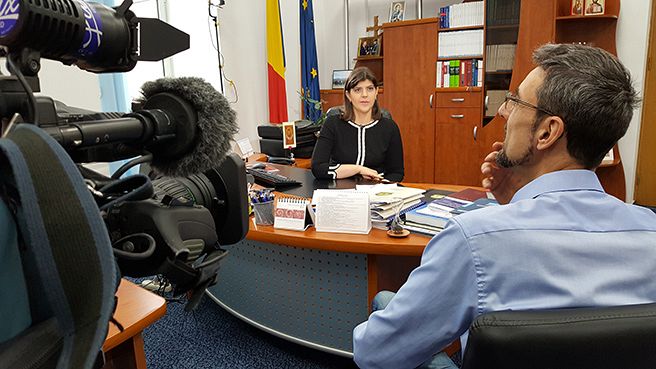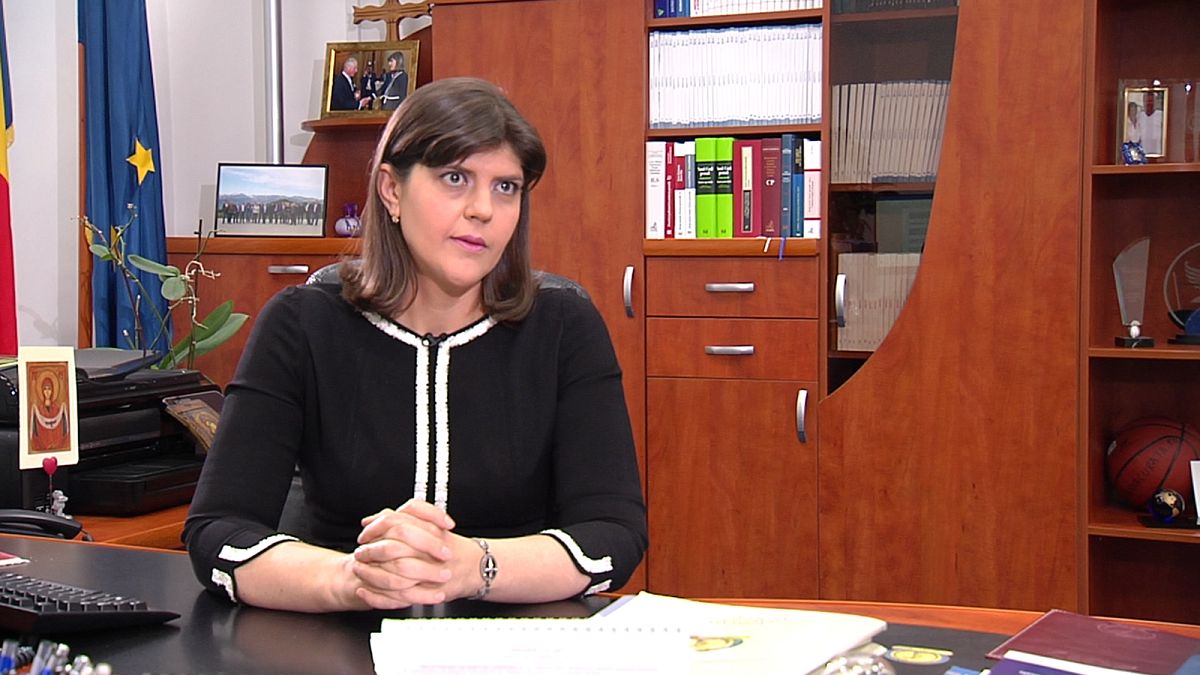The ongoing reform of the Romanian justice system could slow down the fight against high-level corruption
Will the Romanian anti-corruption directorate, DNA, be able to crack down efficiently on high-level graft in the future? The DNA is one of Europe’s best anti-corruption units, ranked among the top 5 (out of the national anti-corruption units in the 28 EU member States). Is this efficient system in the fight against corruption now at risk? The controversial, ongoing reforms of the justice system in Romania could have a huge impact on the DNA. Euronews reporter, Hans von der Brelie, met Laura Kövesi, the head of the DNA, in Bucharest to have a chat about investigative tools and the best ways to put corrupt politicians on trial and eventually into prison.
euronews:
To what extent could this ongoing reform of the Romanian justice system hamper or stop your daily fight against high level corruption?
Laura Kövesi:
If we refer to the last bills amending the legislation regarding the judiciary system, or regarding the criminal code or criminal procedure code, it will have a very serious effect on our work. We will not investigate corruption as efficiently as now. I can give you some examples. These amendments are very bad because they eliminate the prosecutors independence, extend the authority of the minister of justice on the prosecutors activity and cut some very useful investigative tools. Since five years ago, DNA sent to trial over 70 high officials. Among them, one Prime Minister, two deputy Prime Ministers, 11 ministers or former ministers and over 50 members of parliament. In the same period the court ruled final conviction decisions on over 30 of those high ranking officials: one Prime Minister, 5 ministers and 25 members of parliament. The rest of the cases are still on trial. So if this amendment comes into force, we will not have these kind of results anymore. We need three important premises for efficiently combating corruption in Romania: the independence of the judiciary, an appropriate legislation which offers to prosecutors good tools to investigate corruption, and we need a specialised structure such as DNA to investigate the corruption of high officials. If one of these premises is eliminated, we cannot fight corruption efficiently anymore.
euronews:
Regarding those tools that you mentioned: You say that there is a real risk that after this reform those investigative tools could be taken away from you. About what are you speaking specifically?
Laura Kövesi:
I can give you an example: If this proposal comes into force, when we have a person coming to the DNA and submitting a complaint against a mayor asking for a bribe for awarding a contract: In this case the prosecutor must inform that mayor that a certain person submits a complaint against him or her, and the prosecutor must invite and must allow the mayor to participate in all criminal proceedings in our office. In this case it is obvious that we can’t obtain any proof, that we can’t investigate any corruption cases.
euronews:
What is exactly the problem?
Laura Kövesi:
For example, in this case with the mayor asking for a bribe, usually we can organise a sting operation, but if the proposal will come into force, we can not do this anymore. Because we need to announce it to him or her. So in this situation the prosecutor will give a call to this mayor and the prosecutor will say to the mayor: We have a complaint against you, we want to catch you in the act, you can come into our office to participate to all our hearings, all our activities – and after that it is obvious we can not catch him… It is a simple example, but these amendments will seriously affect our activities. We do not speak about some petty corruption, we speak about corruption on a high level. And in the past few years we’ve investigated these kind of crimes. And I think this is the reason why at this moment they are trying to change the legislation, not to have a good legislation, not to have an efficient legislation, but to try to stop our investigations. And I think the reasons these amendments were proposed, were our investigations and the recent decisions ruled by court.
euronews:
Which means that politicians try to stop you so that they can’t be put into prison…
Laura Kövesi:
If the political will is to fight against corruption, these amendments will not come into force.
euronews:
You mentioned the tools these laws could take away from you, and also the independence of justice. Who can nominate or revoke high level prosecutors? What is the problem when you are saying the independence of justice is threatened?
Laura Kövesi:
If the prosecutors are no longer independent, they will no longer have the freedom to open investigations, they will not have the freedom to make investigations into the cases where high officials are involved. I can remember the time before 2004 when the prosecutors were not independent and the decisions in criminal cases were taken at the headquarters of some political parties. We can go back to those times, when there wasn’t any important investigation, when there were no investigations against ministers or members of parliament or any high ranking officials. If you imagine that the prosecutors are not independent and they are subordinated for example to the minister of justice, in most of the cases the minister of justice is a political person. How can a prosecutor open an investigation against a member of the same political party that the minister of justice belongs to? It is very difficult. The independence of justice is not a privilege for the magistrates. The independence of justice is a fundamental principle in a democratic society. Only an independent justice can assure a fair trial. Only an independent justice can assure that the law is equal for everybody.

